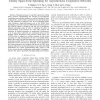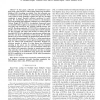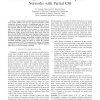152 search results - page 21 / 31 » To Code or Not To Code in Multi-Hop Relay Channels |
VTC
2010
IEEE
13 years 6 months ago
2010
IEEE
—This paper proposes a cooperative space-time coding (STC) protocol, amalgamating the concepts of asynchronous cooperation, non-coherent detection as well as Distributed Turbo Co...
CORR
2007
Springer
13 years 8 months ago
2007
Springer
Abstract— In this paper, collocated and distributed spacetime block codes (DSTBCs) which admit multi-group maximum likelihood (ML) decoding are studied. First the collocated case...
GLOBECOM
2008
IEEE
14 years 2 months ago
2008
IEEE
—Relay systems have large and complex parameter spaces, which makes it difficult to determine the parameter region where the system achieves a given performance criterion, such ...
CORR
2007
Springer
13 years 8 months ago
2007
Springer
— Design criteria and full-diversity Distributed Space Time Codes (DSTCs) for the two phase transmission based cooperative diversity protocol of Jing-Hassibi and the Generalized ...
CORR
2010
Springer
13 years 8 months ago
2010
Springer
Abstract--The L-user additive white Gaussian noise multiway relay channel is considered, where multiple users exchange information through a single relay at a common rate. Existing...



